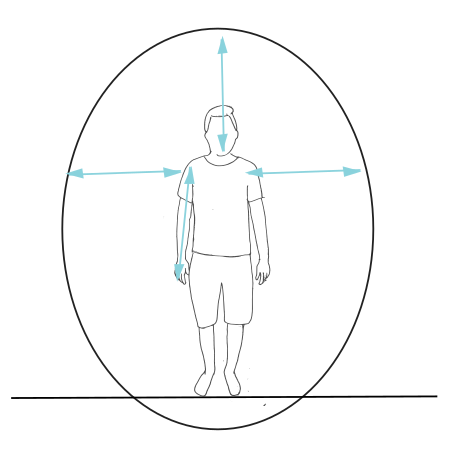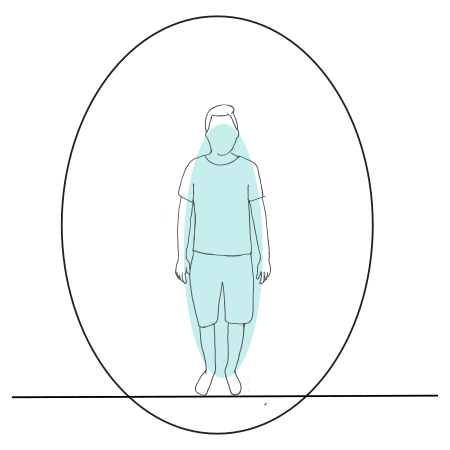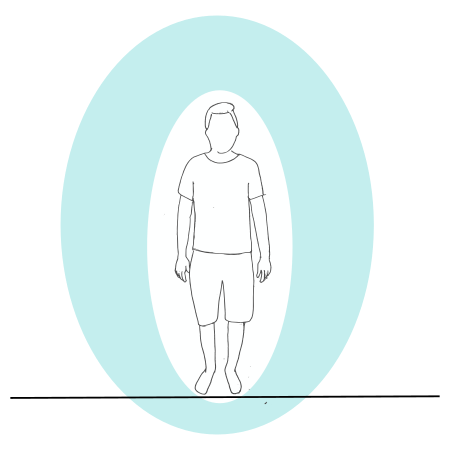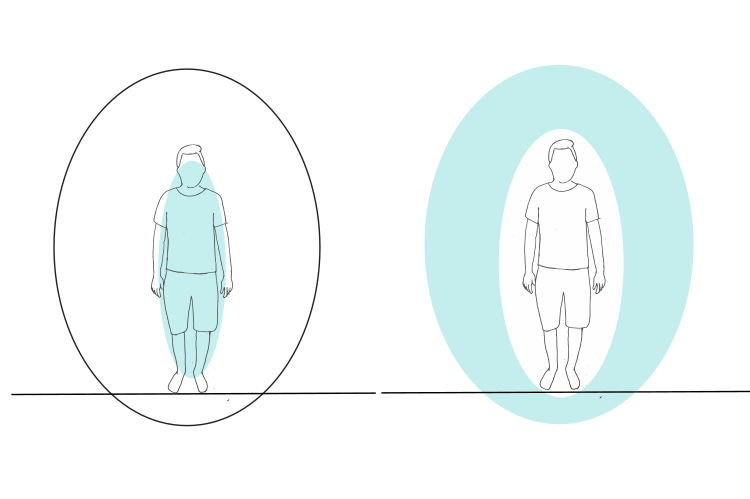There are visible and invisible aspects that form part of self-care. Some things you can see and touch and measure: the food you eat, your hours of exercise, the amount of water you drink, the hours of sleep you get, just to name a few practical ones.
And then there are invisible aspects that also influence your wellbeing. How much do you feel loved and understood by the people in your life. How much connection to you feel? With which attitude are you making yourself go to the gym? How kind are you to yourself?
Today, I want to give some space to, well, your personal space. It is one factor that, for me, also falls into the category of self-care. I believe being aware and able to hold your personal space is a basic skill that is – unfortunately – not taught in schools (yet!) – but vital for your well-being and sense of confidence and connectedness with the world.
What is your personal space?
Your personal space, also peri-personal space in research, is the space that immediately surrounds you. It is the space within your grasp that you can manipulate. Basically it goes as far as your fingertips can reach. Your brain is mapping this space around you at any given moment. This means that you are consciously or unconsciously aware of this space at any second.
I believe that being attentive to your personal space is a great resource. It is helpful in setting healthy boundaries and becoming aware early on of what surrounds you and when there is a need to act to keep your sense of wellbeing and wholeness.

Why is it important for self-care?
Many people who come to work with me say something in the lines of ‘I want to be open and caring, but at the same time I feel the need to defend myself. I have to be clear on my boundaries.’
A person shrinks to some extent when feeling stressed, vulnerable, or threatened in some way. When you start paying attention to small details, you’ll see a contracted diaphragm combined with a slouched back, or a frown and narrowed eyes, a tight belly and a the knees pointing inwards.

We all have developed our individual ways of defending ourselves. And this shrinking usually is connected to a reduced awareness of personal space. It feels someone invaded your space. Depending on the strategies you have used up to now, you might start mulling the situation over in your head, feeling overwhelmed,
What usually doesn’t happen automatically: when you are in a reactive state, you don’t remember that you have the liberty to move out of it again. And one doorway how you can do that is to bring your attention outside again and to fully inhabit the space.
When I feel vulnerable and threatened, I contract; I narrow my life space. When i no longer feel threatened, I open up again and take more space. – Stanley Keleman in Your body speaks its mind, p. 24
Taking care of yourself also means taking care of your personal space. And I believe when you have more awareness for the space around you, you can catch many a problem, or mood, or insight faster than when it hits you when you are already caught in your stuck or reactive state.
Are you ready to give it a go? Are you ready to take up your personal space?
Here’s a brief embodied practice to explore your personal space:
Embodied Practice:
Center and extend your attention to your personal space
This is a practice that you can do at home by yourself, or you can practice in public places that allow you to explore how it is for you to hold your personal space next to others.
If you practice in a shared space with others, it will provide you with many clues as to how you perceive the people and space around you when you hold your own space in this given situation.
- Align yourself by doing a quick body scan from head to toe – breathe freely.
- Imagine like a line going through the middle of your body, a centering line.
- Gently straighten your spine.
- See if you want to move or wiggle a bit so you can settle into a position that works for you.
- When you feel settled, with every inhale extend your attention to the space surrounding your body until you fill your entire personal space.
- Do this for about 3 full breaths.
You can also check if this practice has also led to a slight change in your mood? I know it can do that. 😉


